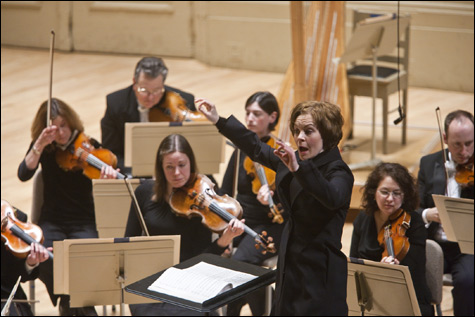Yehudi Wyner and John Harbison, Susanna Mälkki with the BSO, Natalia Gutman with the BPO, and BLO's Don Giovanni
By LLOYD SCHWARTZ | April 28, 2009

LADY ON THE PODIUM After hearing what Mälkki did last weekend, you wonder whether the BSO shouldn't have more female conductors. |
Two of Boston's most admired and honored composers (both Pulitzer winners) have just celebrated landmark birthdays: Yehudi Wyner his 80th and John Harbison his 70th. Theodore Antoniou's Alea III celebrated Wyner with a free concert that included two of his major chamber pieces — the big, powerful, always surprising Horntrio (1997, a Pulitzer finalist), with Wyner himself (a stunning pianist) joining the superb Laura Carter (horn) and Krista Bruckland Reisner (violin), and the seductively lyrical 1999 Oboe Quartet, with oboist Jennifer Slowik joining Reisner, violinist Peter Sulski, and cellist Leo Eguchi — along with the deceptively, teasingly simple jeu d'esprit Passage I (1983). This last was played by a small chamber group expertly led by Francisco Noya, who also led The Second Madrigal: Voices of Women (1998), a cycle of poems from the Chinese, Sanskrit, Polish, and American (May Swenson's "Question") about older women in love and women aging. Excellent, evocative performances, though soprano Karol Ryczek's monochromatic timbre, despite her technical skill, diminished her expressive possibilities.Wyner is not easy to place. His works range from the elegant and witty to the passionate and dramatic, from the spiritual to the raffishly boogie-woogie — often in the same piece. He's contemporary in idiom, sonically inventive and compelling, structurally and emotionally complex, yet immediately accessible. A new recording on Bridge features his exhilarating 2006 Pulitzer-winning piano concerto Chiavi in mano, with Robert Spano leading pianist Robert Levin and the BSO in the world premiere, and Susan Davenny Wyner (Wyner's wife) conducting three haunting and moving works new to me.
Then MIT presented a free Harbison concert at Kresge Auditorium honoring its most honored non-techie faculty member. We got one world premiere, the delicious French Horn Suite, for two antiphonal pairs of horns (one of the players Jean Rife, the work's commissioner), with punning movement titles like "Double Entendre," "La Ronde" (turning Schnitzler's famous play into woozy "rounds" of "Frère Jacques" and "Row, Row, Row Your Boat"), and "Le Quartier Latin" (in quarter tones, of course).
The four other works were also new to me. Harbison himself conducted A Clear Midnight, a poignant cantata for soprano (Susan Consoli), four male singers, and five strings that used Walt Whitman to commemorate soprano Georgina Joshi and the four of her colleagues who were killed in a plane crash. He also led the dazzling Crane Sightings, with dazzling solo violinist Rose Mary Harbison serving as intermediary between humans (five strings) and the mysterious ancient birds. Then, playing viola, Harbison joined three other violists — among them MIT superstar Marcus Thompson, who had the most rapturous music — in Cucaraccia & Fugue. The evening ended with William Cutter leading the MIT Chamber Chorus and an orchestra of star soloists in the 2005 Umbrian Landscape with Saint, which includes 10 brief variations inspired by Giotto's St. Francis frescoes in Assisi and a heartstopping choral setting of St. Francis's "Canticle of Living Creatures" (as Harbison translates it).
 Related
Related:
John Harbison plus 10, Mad love, Creationists, More 
- John Harbison plus 10
Classical music in Boston is so rich, having to pick 10 special events for this winter preview is more like one-tenth of the performances I'm actually looking forward to.
- Mad love
The destructive power of jealousy makes a good subject for opera.
- Creationists
Simon Rattle and the BPO, Fabio Luisi and the BSO, John Harbison and Emmanuel Music
- Contertizing
Boston Lyric Opera follows up Dvorák’s moonstruck Rusalka, with Christopher Schaldebrand in the title role of Mozart’s Don Giovanni, the BSO and much more.
- Baroque and beyond
Ten-best lists usually come at the end of the season, but this year the Phoenix has asked its critics to provide a calendar of 10 events that, at least on paper, might wind up on an end-of-season Top 10. Boston, in case you didn't know it, is a great city for classical music, so it's not easy to keep the list short. But here goes.
- Beloved of God
One of my most profound musical experiences took place when I was still a graduate student.
- Lift every voice!
Opera is the big word for 2009.
- Let's rock
WGBH radio has ended its 58-year tradition of live Friday-afternoon BSO broadcasts, and it doesn't seem that public outcry is going to change that.
- Almost
The Boston Lyric Opera comes maddeningly close to having a good Carmen . (The production continues at the Shubert Theatre through November 17.) Keith Lockhart leads a superb orchestra and chorus and a cast of plausible singers/actors in a compelling if not spine-tingling performance.
- Leon Kirchner, 1919–2009
Craggy, tender, passionate, witty, rough-edged, lyrical, uncompromising, Leon Kirchner's music, so like the man himself, made an indelible impression. Even in his recent appearance at a 90th-birthday tribute concert at the Isabella Stewart Gardner Museum, the old fire and wit, the frankness and the refusal to sentimentalize, were there.
- Resurrections
Back in pre-history (1964), a brilliant young Brit, a cellist (student of Benjamin Britten) and conductor, came to town and shook up the local classical-music scene.
- Less

 Topics
Topics:
Classical
, Entertainment, Music, Don Giovanni, More  , Entertainment, Music, Don Giovanni, Don Giovanni, Claude Debussy, Natalia Gutman, Natalia Gutman, Natalia Gutman, Elizabeth Rowe, Rose Mary Harbison, Less
, Entertainment, Music, Don Giovanni, Don Giovanni, Claude Debussy, Natalia Gutman, Natalia Gutman, Natalia Gutman, Elizabeth Rowe, Rose Mary Harbison, Less 